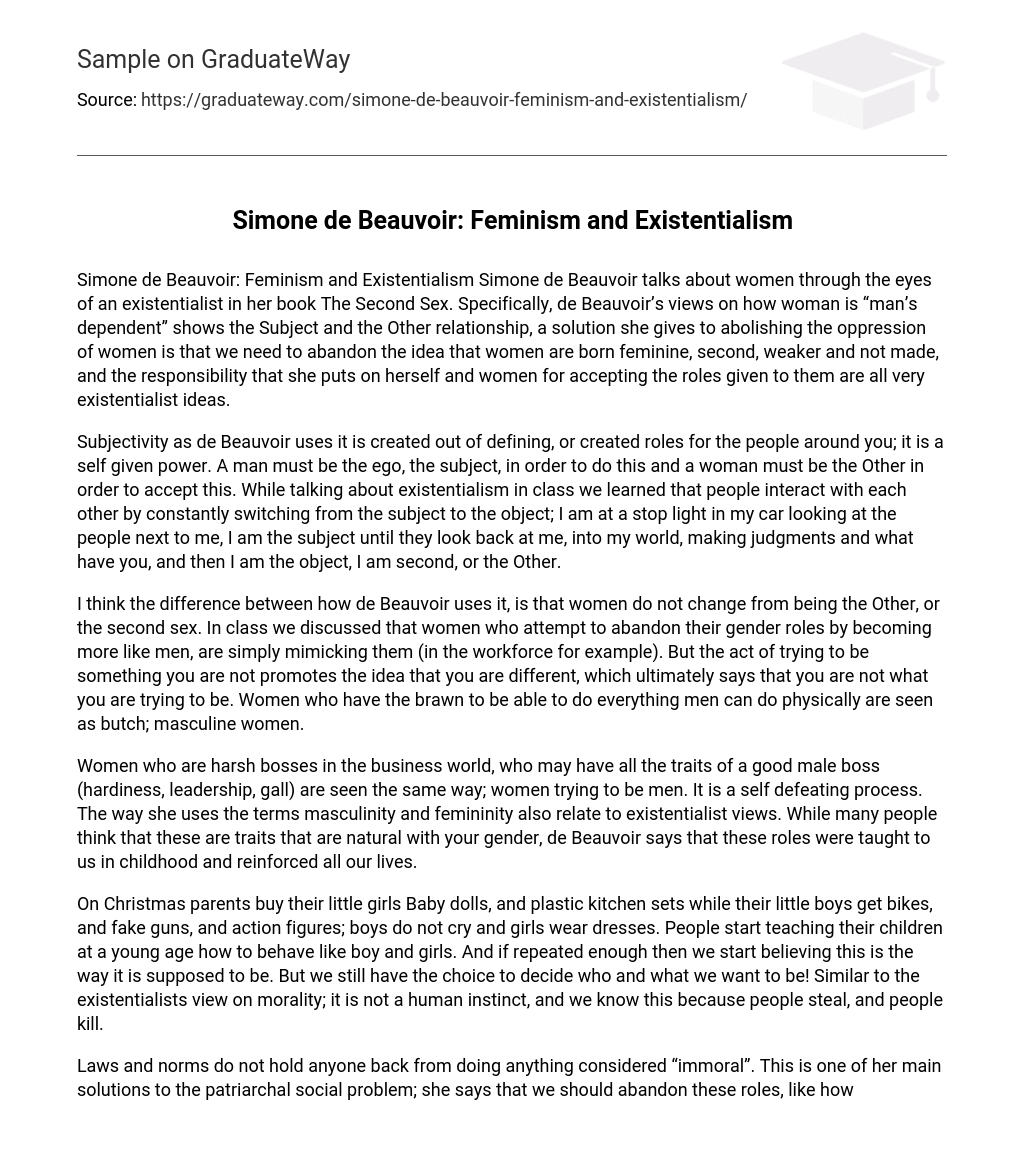In her book The Second Sex, Simone de Beauvoir examines the concept of women through an existentialist lens. She focuses on how society perceives women as reliant on men and emphasizes the Subject and the Other dynamic. De Beauvoir proposes that to combat the oppression faced by women, we need to challenge the belief that femininity is innate and that women are naturally inferior and subordinate. Furthermore, she underscores the significance of assuming accountability for societal expectations imposed on women, aligning with existentialist principles.
According to de Beauvoir, subjectivity involves creating roles for oneself and others. Men are expected to be the ego, the subject, while women must embrace the role of the Other. In our existentialism class, we learned that people constantly switch between being the subject and object when interacting with others. For example, when I wait at a stop light in my car, I become the subject as I observe those next to me. However, as they look back at me and enter my world with judgments, I become the object or the Other.
I believe de Beauvoir’s usage of the term “Other” is distinct in that women are perceived as always being the Other or the second sex. In our class, we deliberated how women who strive to escape their gender roles by emulating men, such as in the workplace, are merely imitating them. However, this act of trying to become what one is not reinforces the notion of being different, suggesting that one is not truly what they aspire to be. Women who possess the strength and capability to perform tasks equivalent to men are often labelled as butch or masculine women.
Women in the business world who possess traits typically associated with a good male boss, such as resilience, leadership, and boldness, are often perceived as individuals trying to adopt masculine characteristics. However, this mindset ultimately undermines their success. Moreover, de Beauvoir argues that the usage of terms like masculinity and femininity aligns with existentialist perspectives. Despite a common belief that these qualities arise naturally based on one’s gender, de Beauvoir asserts that they are taught to us during childhood and continuously reinforced throughout our lives.
During Christmas, parents typically buy Baby dolls and plastic kitchen sets for their daughters, while their sons receive bikes, fake guns, and action figures. Society expects boys to avoid crying and girls to wear dresses. Children are taught from a young age how to conform to these gender roles. If this idea is consistently reinforced, it becomes ingrained as the norm in our beliefs. However, we still have the ability to choose our own identities and aspirations. This concept corresponds with the existentialists’ view on morality – it is not an inherent human instinct, as proven by acts of theft and murder.
According to de Beauvoir, laws and norms do not prevent individuals from engaging in actions considered “immoral”. This solution to the patriarchal social problem suggests abandoning predetermined roles, similar to the existentialist philosophy of disregarding the morals instilled by our fathers. By rejecting these ideas and forging our own sense of purpose, we can attain the freedom that has been unfairly denied to us as human beings. de Beauvoir emphasizes that freedom, just like in existentialism, holds significant importance in both feminism and her own ideology. She asserts that breaking free from the limitations that marginalize women within society will ultimately ensure liberty for all.
These existentialist views bolster women’s position, in my view. Although the theory may claim that women are to blame for their long-standing oppression, it also empowers them with the ability to choose. According to this idea, we are not obliged to accept this oppression. There is no physical condition that renders us any less significant than men, or any less human. de Beauvoir argues that there is no predetermined fate that keeps us confined to our role. The societal rules we abide by are man-made and hold no genuine significance in our actions; a direct result of existentialism.
The power to transform the world, encompassing lifestyles, ideas, and social norms, is highly empowering. Nevertheless, this power can be diminished if women cling to traditional gender roles or strive to emulate men solely for the purpose of being perceived as equals rather than naturally being equals. It is crucial for individuals to recognize that men and women are interconnected, with neither existing without the other. Consequently, each person should determine their own sense of purpose as a liberated individual.





